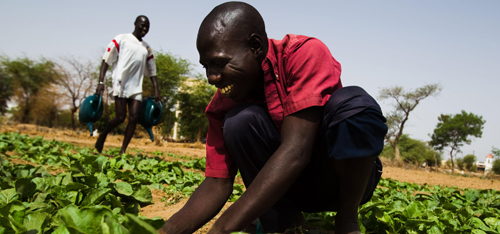Mali
In Mali, three-quarters of the country's 15.3 million people rely on agriculture for their food and income. Most are subsistence farmers, growing rainfed crops on small plots of land. However, the 2011 drought across the Sahel region, followed by conflict in northern Mali, caused a major slump in the country's agricultural production, reducing household assets and leaving many of Mali's poor even more vulnerable.
Furthermore, civil strife displaced more than 450 000 people. Many took refuge in neighbouring countries, often fleeing with their livestock, only to compete for scarce natural resources in vulnerable host communities. As the security situation began to improve in 2013, the displaced started to return home to rebuild their lives and livelihoods. Yet poor purchasing power among many Malians throughout the country has raised the risk of food insecurity and the spectre of famine threatens some 50 000 children.
IPPM programme in Mali
FAO has been carrying out IPPM activities in Mali since 2001, supporting government programmes and policies on agricultural development, food security and natural resource management.
The IPPM programme in Mali is working to help farmers improve efficiencies, production levels and profits in the production of cotton, rice, vegetables, and a variety of other cash and food crops. The programme includes a project on climate change adaptation, which works with communities to explore how to adapt cropping methods to get more from their land amid increasing climate challenges such as drought and flooding.
By encouraging farmers to diversify agricultural and livestock production, such as integrated rice-fish farming, the IPPM approach not only benefits household incomes and diets, but also the environment.
Of the 85 054 farmers trained by the IPPM programme since 2001, one-third have been women.
IPPM projects in Mali
- All ACP Agricultural Commodities Programme, including cotton (regional)
- Initiative to boost rice production in West Africa (regional)
- Integrated Production and Protection Management in West Africa (regional)
- POPs reduction in Niger and Senegal Rivers (regional)
- Supporting competitiveness and sustainable intensification of African cotton sectors through capacity development on IPPM (regional)
- Integrating climate resilience into agricultural production for food security in rural areas of Mali (national)
Partners
FAO has worked with many different partners to achieve its IPPM goals in Mali, including: Assemblée Permanente des Chambres d’Agriculture du Mali; Association des Organisations Professionnelles Paysannes; Direction Nationale de l’Agriculture; Institut d’Économie Rurale; non-governmental organizations; Office de Protection des Végétaux; Union Nationale des Sociétés et Coopératives de Producteurs de Coton; and other partners.
The IPPM programme in Mali is grateful for the continued support from its resource partners, including: African Development Bank; Global Environment Facility; Government of the Kingdom of Spain; Government of Mali; Government of the Netherlands.

